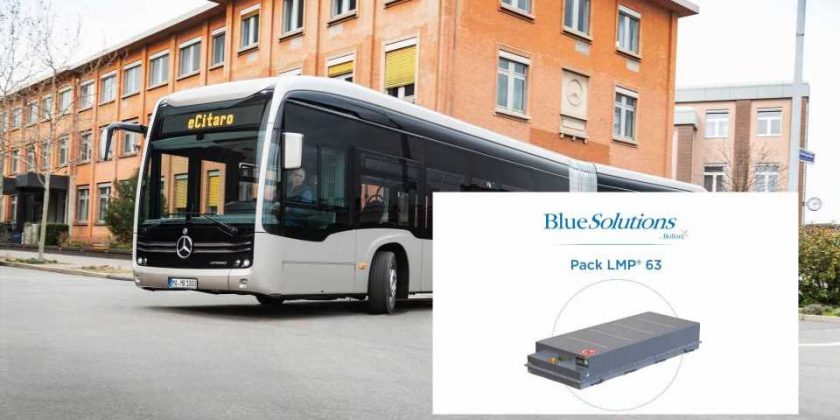The LMP cells were also on the failed BlueIndy cars in Indianapolis, but they have evolved.
When we told you about the Mercedes-Benz eCitaro’s option to have solid-state batteries, we said we would go after more info on these cells. We can now finally tell you what they are and who produces them. These all-solid-state battery packs are composed of LMP – or Lithium Metal Polymer. That’s a known solution, which has equipped vehicles since 2007. Anyway, BlueSolutions stresses they are all-solid-state batteries, a tech people still pursue.
We have told you about Solid Power, for example. The company has recently announced it is producing its first cell prototypes with amazing characteristics, but that production will have to wait until 2026. BlueSolutions’ LMP already powers buses and cars, like the failed BlueIndy cars in Indianapolis.

At the time we reported that the car-sharing program there was deactivated, we mentioned LMP packs had 30 kWh each and would be “used in energy storage projects around the world.” We also mentioned they “require a high-temperature of about 60°C in normal operation. It means that they like to work 24/7 (charge/discharge) or will suck energy at the charging point just to remain hot when idle to stay ready for use.”
Adrian Tylim, a business development manager for BlueSolutions in the US, told us these specs have changed.
“The Group Bolloré (BlueSolutions owner) pioneered all-solid-state battery both in transportation and in stationary storage for renewables integration. (…) Bolloré took a bold position early on to prove the technology by investing heavily in the manufacturing of 5,000 electric cars (the BlueCars). These cars were equipped with the 1st generation of the technology.
The current LMP 63 Pack belongs to the 3rd generation and is being deployed on Mercedes Benz buses, Ringo projects, and other customers and has more energy density. The new packs have 63 kWh. The next 4G generation likely in early 2022 will have more energy, 70 kWh.”

Regarding the operation temperature, it has also been modified.
“Our all-solid-state battery is designed to operate at 80°C. As it charges and discharges, it cycles over and under this temperature. This is part of the chemistry at work. All this without requiring a cooling system.
The battery is guaranteed to have the functionality per the specs within the operating temperature range of -30ºC to 65ºC; meaning that the pack is able to stabilize itself at 80°C (internally) even if the outside temperature is as low as -25°C or as high as 60°C, for example. Performance and cycle life will not be adversely affected by the ambient temperature within that range. This is very important!”
That indeed requires LMP to be connected to the grid when the vehicles are not working, but perhaps this is a must due to another LMP characteristic: it does not accept fast charging.
“At low temperatures and if the vehicle is left unplugged, depending on the length of time and outside temperature, the battery may require to reach the internal operating temperature before it can be used.”
What helps is that “the battery has heating elements attached to the outside for this purpose, with” an energy consumption that “is extremely low,” according to Tylim.
“Information is proprietary but please, trust me when I say this is low. (…) As you know, Li-ion is limited and requires insulation at low temperatures but cooling in higher temperatures. This is not the case with our battery. The pack will work as stated within the operating temperature range whether it is operating in Chicago’s cold winter or Singapore’s hot and humid summer.
In comparison, our LMP packs for electric vehicles include insulation (since our battery does not require cooling), electrical protection, BMS, Thermal Management, etc. All inside a metallic box that is insulated and able to withstand pressure wash.”
All things considered, we really have an ASSB for sale, but it is better suited to mass transportation, such as buses and car-sharing programs. Car owners will probably prefer an all-solid-state battery that can cope with fast charging, and that does not demand to be plugged when idle, but it is interesting to see LMP is also evolving. After all, clean transportation goes well beyond personal passenger vehicles.
Source: Read Full Article
